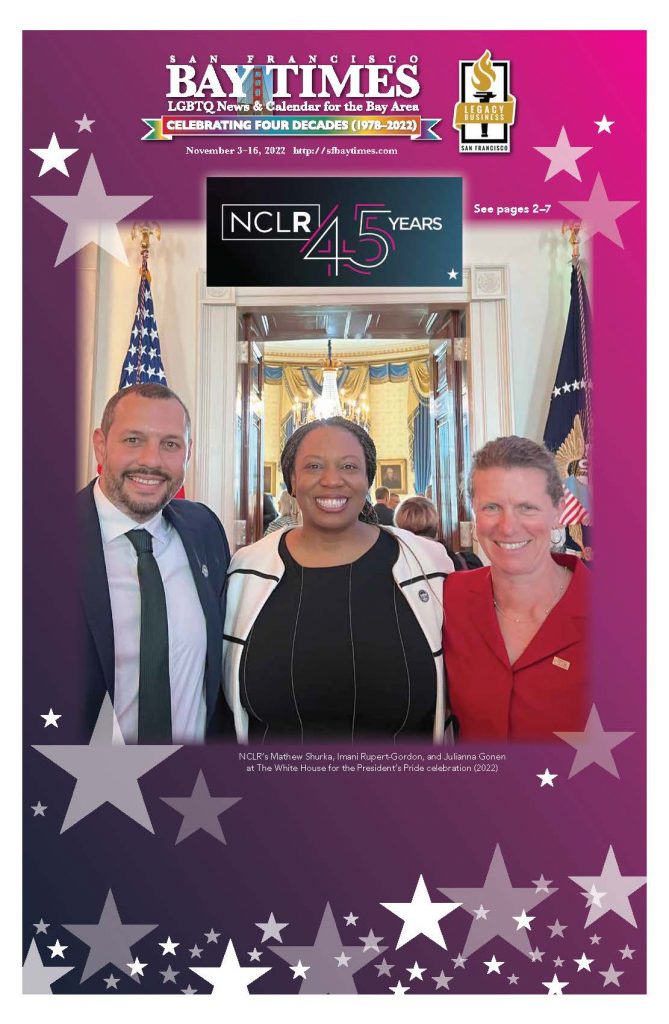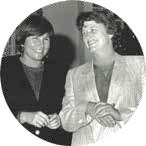
The arc of history is long, but NCLR continues to bend it towards justice and equity for the LGBTQ community and our families.
Since 1977, the National Center for Lesbian Rights (NCLR) has been fighting for justice and equity for LGBTQ people and making history along the way. As NCLR celebrates 45 years, we know we are standing on the shoulders of giants who gave their all to make our successes possible.
Giants like Sylvia Rivera and Marsha P. Johnson, who helped spark our movement for equality in 1969 at Stonewall Inn. History makers like Harvey Milk, who inspired LGBTQ folks around the world to come out and run for office, and Governors Kate Brown and Jared Polis who carry on that legacy. Outspoken activists like Bayard Rustin and Aimee Stephens, who understood the importance of standing up for what’s right, no matter what the cost. And sports icons like Sue Bird, Billie Jean King, Carl Nassib, and Chris Mosier, who have shaped history both on and off the field.
As NCLR celebrates its anniversary, let’s look back on some of the great moments in the organization’s 45 years of history-making for the LGBTQ community and our families:

In 1977 two lesbian leaders—Donna Hitchens and Roberta Achtenberg—co-founded the Lesbian Rights Project, later renamed the National Center for Lesbian Rights. Achtenberg went on to be the first out lesbian to serve on the San Francisco Board of Supervisors. Hitchens was the first out lesbian to be elected to the bench in U.S. history.
Family Law is at the heart of NCLR’s mission. In 1980, NCLR won a landmark victory in California for Denise Kreps, who was denied a job as County Sheriff because of her sexual orientation. In 1986, NCLR also successfully represented Annie Affleck and Rebecca Smith as they became one of the first same-sex couples to jointly adopt in the U.S. In 1988, NCLR won one of the nation’s first court custody battles for a parent with AIDS on behalf of Artie Wallace, a gay dad whose son was kidnapped by his ex-wife. And in 2009, NCLR won a landmark case requiring Florida to recognize second parent adoptions from other states.

NCLR became the first LGBTQ legal organization in the country to launch a project dedicated to advocating for LGBTQ youth. In 2020, NCLR won a historic U.S. Supreme Court case upholding the right of colleges and universities to enforce non-discrimination policies that protect LGBTQ students. Directly following in 2011, NCLR successfully represented two LGBTQ students in Minnesota in one of the first cases allowing a same-sex couple to attend a school dance.
NCLR was the first national LGBTQ legal organization to create a program for LGBTQ immigrants and asylum seekers. The organization’s Immigration Project has helped thousands of LGBTQ immigrants obtain legal status in the U.S. NCLR has represented more than 450 asylum seekers and, to date, has never lost an asylum case. In 2012, NCLR helped a lesbian couple from the United Arab Emirates when they arrived in the U.S. to escape death threats from their families.

NCLR was also the first national LGBTQ legal organization to launch a Transgender Law Project. This project has won many vital cases—including stopping Trump’s cruel Trans Military Ban in 2017—and continues fighting for trans rights, such as winning injunctions in 2022 against laws criminalizing essential medical care for transgender children in Alabama and banning transgender girls from school sports in Utah.

2001 also became the first national LGBTQ organization to tackle homophobia and transphobia in sports with the launch of the Sports Project led for a long time by LGBTQ sports pioneer Helen Carroll. In 2005, NCLR filed a lawsuit against Penn State on behalf of lesbian players who claimed they were discriminated against by their coach.
NCLR’s Legal Director Shannon Minter was lead counsel for several same-sex couples in the landmark California marriage equality case. In 2014, NCLR helped win a lawsuit that allowed the first same-sex couples to marry in Miami-Date County, FL. NCLR went on to litigate marriage equality cases in Alabama, Florida, Idaho, New Mexico, North Dakota, Tennessee, and Wyoming. In 2015, NCLR’s Tennessee case was part of the historic U.S. Supreme Court victory that established marriage equality nationwide.

NCLR’s Born Perfect is the first national legal campaign to end the dangerous and discredited practice of conversion therapy. A priority of NCLR’s efforts since the early 1990s, Born Perfect has worked to ban this deadly practice in more than 20 states and 100+ municipalities in the U.S. In 2022, the Ninth Circuit unanimously upheld Washington state’s law protecting LGBTQ minors from conversion therapy.
NCLR embarked on the next chapter in its history by naming Imani Rupert-Gordon as the organization’s Executive Director, succeeding Kate Kendell after 22 years. Rupert-Gordon’s leadership on LGBTQ justice and its intersection with economic, gender, racial, and disability justice is changing the scope and trajectory of our movement. In September 2022, she was invited to join Vice President Kamala Harris and other civil rights leaders for a meeting at the White House to stress the urgency to protect reproductive and voting rights. On November 11, Rupert-Gordon will speak at her first in-person Dinner and Party since joining NCLR as Executive Director.

As has been said, the arc of history is long but bends towards justice, and after 45 years of fighting for justice and equity for everyone in our LGBTQ community, NCLR’s commitment to that goal is steadfast and unshakable. As the organization embarks on the next 45 years, we know there will be many more struggles while NCLR’s history continues to be written. No matter the struggles we will face together in the coming days, years, and decades, NCLR will be here for you—fighting for historic wins, dismantling hatred and bias, and working for a day when every person in our community can be their full self.
Today we celebrate NCLR’s 45th Anniversary—and tomorrow, continue the fight for a more just and equitable future for everyone.
Published on November 3, 2022
Recent Comments